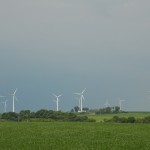Panorama, the BBC’s popular current affairs TV show has been heavily criticised for it’s recent investigation into Britain’s rising energy bills.
 The programme set out to look at the reasons why the country is being forced to deal with soaring energy costs, but since going to air on Monday evening, the show has come under fire for failing to address the issue of rising wholesale gas and electricity costs. Instead, Panorama focused the blame onto the uptake of renewable energy.
The programme set out to look at the reasons why the country is being forced to deal with soaring energy costs, but since going to air on Monday evening, the show has come under fire for failing to address the issue of rising wholesale gas and electricity costs. Instead, Panorama focused the blame onto the uptake of renewable energy.
An article in the Guardian, written by environment correspondent Damian Carrington, has heaped criticism on the BBC investigation, with Mr Carrington saying:
“There was a vast, astonishing and utterly unforgivable hole at the heart of the BBC Panorama TV show on Monday, which claimed to be investigating what has caused energy bills in the UK to soar in recent years: the rising wholesale cost of gas and electricity.”
Instead, the show’s reporter, Tom Heap, claimed that renewables, and essentially offshore wind farms, was the main contributing factor. The Panorama programme failed to address the fact that wholesale energy costs have continued to rise, and that the price of this winter’s gas is around 40% higher compared to last winter’s. According to energy regulator Ofgem, these wholesale costs make up 56% of home energy bills, which is far and away the biggest single factor.
The programme was partly based on the ‘Thinking About the Affordable’ energy report from accountancy firm KPMG. But the renewables industry has hit back at the inaccurate energy report, saying the publication is flawed and misleading. The report claims that favouring cheaper nuclear and gas-fired power stations over wind energy would save every person in the UK around £550.
The Guardian also criticised Panorama’s failure to reveal that energy consumers would only have to pay around £20 a year for all renewables subsidies. By including all Government levies for schemes to increase energy efficiency and alleviate fuel poverty the cost rises to about £80 a year which is far less, when you compare it to the £170 increase in the average gas bill since last year, thanks to the rise in wholesale prices.
In response, reporter Tom Heap said Carrington’s “vast, shocking hole” refers to figures based on current costs. Heap pointed out that the programme was clearly focused on future bills.
“Damian Carrington’s description of this week’s Panorama is strident, inaccurate and also reveals a big green blind spot: renewable technologies are currently expensive and demand subsidy,” hit back Heap.
“Panorama did not lay all the blame for likely price rises at the green door. A large chunk of the programme was spent explaining how old power stations needed replacing and pricey or volatile foreign gas is mentioned three times,” he added.
As contentious issues go, this one is unlikely to run out of steam anytime soon.


